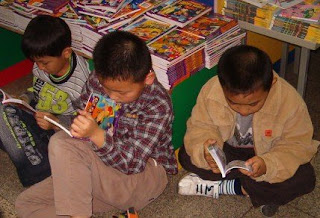A Word on Expert Opinions

Today's New York Times op-ed columnist Nicholas Kristof drove home a particularly sore point with me, in regards to my book A Billion to One: An American Insider in the New China. This book, and of course I, the author, take the position that a truly objective and accurate perception of what life is really like in China today could only be offered by someone who is not a "known expert." Such a person, for example Kristof himself, would be watched, followed, monitored, and escorted everywhere. And his fully programmed and monitored visit would be short: a week, perhaps two, a month at most in a foreign setting like China. Whereas I, as an unknown (at least in China) was free to come and go, live among the people, walk the walk, and talk the talk (well, some of it, anyway).
Yet when I returned after nearly three years to the States with a stack of dispatches, chapters, blogs and memoirs about those experiences (and a new Chinese wife and step-daughter to boot) my subsequent book, while represented by a top literary agent, was dismissed by virtually every major New York publisher, always for the same reason: I was not an "expert." Not, at least, in their eyes, or those of, say, The New York Times. Which was to say, of course, that I was not sufficiently famous to know anything.
So let's take a look at what Kristof had to say today on this subject, since it is all those well-known experts who have just driven a stake through the heart of the global economy, starting with our own; and it was other similarly admired "experts" who had previously and recently succeeded in getting us embroiled in yet another unwinable war, enabling others to loot our national treasury in the name of "reducing government", and trashing or ignoring all accepted science in terms of environmental, economic, legal, medical, social, or cultural values and institutions in our country.
To quote Mr. Kristof, on the subject of "experts":
do experts actually get it right themselves? The expert on experts is Philip Tetlock, a professor at the University of California, Berkeley. His 2005 book, “Expert Political Judgment,” is based on two decades of tracking some 82,000 predictions by 284 experts. The experts’ forecasts were tracked both on the subjects of their specialties and on subjects that they knew little about.
Yet when I returned after nearly three years to the States with a stack of dispatches, chapters, blogs and memoirs about those experiences (and a new Chinese wife and step-daughter to boot) my subsequent book, while represented by a top literary agent, was dismissed by virtually every major New York publisher, always for the same reason: I was not an "expert." Not, at least, in their eyes, or those of, say, The New York Times. Which was to say, of course, that I was not sufficiently famous to know anything.
So let's take a look at what Kristof had to say today on this subject, since it is all those well-known experts who have just driven a stake through the heart of the global economy, starting with our own; and it was other similarly admired "experts" who had previously and recently succeeded in getting us embroiled in yet another unwinable war, enabling others to loot our national treasury in the name of "reducing government", and trashing or ignoring all accepted science in terms of environmental, economic, legal, medical, social, or cultural values and institutions in our country.
To quote Mr. Kristof, on the subject of "experts":
do experts actually get it right themselves? The expert on experts is Philip Tetlock, a professor at the University of California, Berkeley. His 2005 book, “Expert Political Judgment,” is based on two decades of tracking some 82,000 predictions by 284 experts. The experts’ forecasts were tracked both on the subjects of their specialties and on subjects that they knew little about.
The result? The predictions of experts were, on average, only a tiny bit better than random guesses — the equivalent of a chimpanzee throwing darts at a board.
“It made virtually no difference whether participants had doctorates, whether they were economists, political scientists, journalists or historians, whether they had policy experience or access to classified information, or whether they had logged many or few years of experience,” Mr. Tetlock wrote.
Indeed, the only consistent predictor was fame — and it was an inverse relationship. The more famous experts did worse than unknown ones. That had to do with a fault in the media. Talent bookers for television shows and reporters tended to call up experts who provided strong, coherent points of view, who saw things in blacks and whites. People who shouted — like, yes, Jim Cramer!
So there you have it. The self-proclaimed expert who shouts loudest gets the most attention. And the most bananas. And apparently public credibility and book deals along with it, even though (as we all suspected anyway) such people tend to be wrong about pretty much everything, pretty much 100% of the time! Amazing, really. And more than a little troubling.
But then, as I noted in the Foreword of my own book, I don't claim to be an expert; only an observer. So, in conclusion, the publishers were right: I am not an expert on anything, including China. But I did live and work there for 30 months. And lived very well. And taught some radical ideas at a major university, and also got to come home and write about it. Even Nicholas Kristof can't make that claim. Not that he would.


Comments
Post a Comment